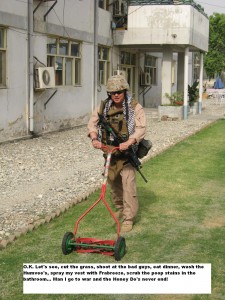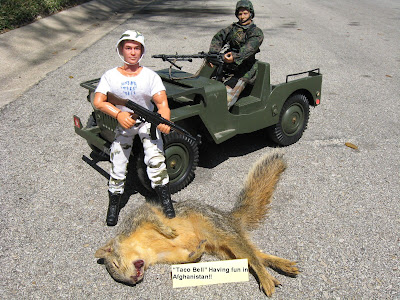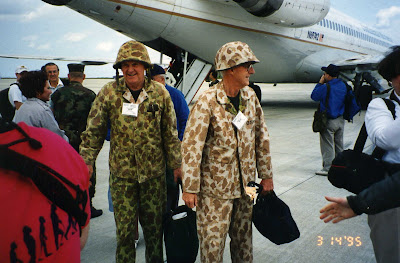March 14th, 2008 Posted in The SandGram v1.0 | No Comments »
Dear Family and Friends:
In a short time I will begin my journey out of Iraq to Kuwait and back home to the United States and my family. First and foremost, I am grateful for having had this opportunity to serve the Corps once again and to have been here during a critical phase of the American military experience in Iraq.
My unique job here provided me with a chance to live and observe Marines at the small unit level and it afforded me unfettered access to a variety of units and operations in Iraq that only a few outside those units ever see and experience. The other day I quickly tallied the cumulative distance I have flown in helicopters crisscrossing Anbar Province and they add up to somewhere over three thousand miles. Add to that number the few hundred miles on the roads in tactical convoys and mounted patrols and the innumerablevisits to Combat Outposts, Joint Security Stations, Patrol Bases, and Forward Operating Bases and you begin to get some limited sense of myodyssey.
There are many memories I will take with me, most of them positive, a few sobering, and some dispiriting. Several of my thoughts and impressions of Iraq, like the war itself, remain unresolved. To fully capture the experiences I have had here would be beyond the scope of this email, so I will try to convey my perspectives with regards to the situation here, a blend of fatalism, pessimism, and optimism.
Many back home say that the United States should not have gone to war in Iraq in 2003. This is the one position I have agreed with since before the war began, because as a student of history and a military man, I found it strategically unwise to open up a distinctly different front while we were engaged in Afghanistan. That strategic decision exposed how ill prepared we were for the sort of war we are fighting in Iraq and Afghanistan, a type of war that requires a different military mindset and significant non-military expertise and resources. We have spent the better part of the last five years trying to make up for those deficiencies and to a great extent we have succeeded when it comes to military training, tactics, and techniques.
However, much work remains to be done with respect to the resources dedicated to the non-military side. For now, the task at hand is to find a militarily sound, politically reasonable, and cost effective means to help the Iraqis maintain security and stability, foster economic growth, and reform their institutions of government. It is reasonable to ask, “Are we and the Iraqis making meaningful progress?” Based on what I have seen and heard, from the walks through Iraqi towns and talks while drinking tea in people’s homes to the briefings I have listened to, I would have to say yes, we are making progress. But much of that progress is occurring on more of an Iraqi timeline and in the context of what is feasible for Iraqis, not what we Americans expect or desire.
Some suggest that we ought to simply withdraw and that act, in and of itself, will get the Iraqis moving toward resolving many of their outstanding issues. Well, we are withdrawing to a limited and prudent extent and the Iraqis are aware that our presence will decrease in the coming year. In some ways, their leaders are probably more anxious than we are about our Presidential election. They know that as we reduce our presence, they will have to solve more problems on their own. I don’t think a rapid withdrawal, as some envision it, would be prudent, because it would be destabilizing,put many Iraqis and Americans at risk unnecessarily, and jeopardize our gains at many levels.
The gradual, incremental approach we are taking with respect to security, rule of law, and governance seems the best way to effect a transition that will have a better probability of success in the long run.What is the “long run”? Well I can’t predict how the future will play out, but if we want to see a viable and stable Iraq, I expect we will need an American presence, civil and military, at least until the Iraqis determine that we are not needed, which may not be for several more years.
The security agreements being negotiated now will probably allow us to remain here beyond that point, more likely for technical and logistics support and with a shallower “footprint”. In the near term though, if certain conditions are met with respect to security this year, I can foresee a further reduction in the American military presence by the end of 2008 and possible further reductions in forces in 2009. Five years into this war, many Americans are right to ask “What have America’s resources done for the average Iraqi?” who still struggles with getting clean water, adequate fuel and electricity, and confronts an unemployment rate of at least twenty five percent.
As I mentioned earlier, security has improved dramatically since this time last year. Iraqi confidence in the local police and judiciary are essential elements of the move toward a functioning society with respect for the rule of law. The slow evolution of these elements is the subject of much attention and frustration here, but there are signs of incremental progress. The credit for the decline in daily violence against Americans and Iraqis can be credited in large part to a combination of American and Iraqi courage and cooperation at the neighborhood levels in cities across Anbar, with Iraqis (mostly Sunnis in Anbar, Shiites in other provinces) informing police and the military of insurgent activities and men standing guard at checkpoints as members of armed neighborhood watch patrols.
The insurgents, for their part, are still indiscriminately attacking civilians and security forces, but with limited effectiveness. Several days ago, near a neighborhood watch post north of here, an Iraqi on watch foiled a suicide vehicle born IED by shooting the driver before he could reach the checkpoint. The car exploded short of its target, killing the driver and wounding the Iraqi sentry. His swift action prevented serious injuries and damage. But it is not just the Iraqis responsible for security who are standing up for security in their communities. Recently in Ramadi, the provincial capital, a suicide bomber entered a restaurant, but before he could detonate his explosives, the owner tackled him. The would be bomber broke free and fled on foot, pursued by Iraqi Police, who shot and killed him.
Much is made in the news of the violent and spectacular attacks that succeed, but you rarely hear of everyday Iraqis fighting against the insurgents and thwarting attacks. When will these sorts of attacks end? I suspect Iraq will experience some level of this sort of violence for years to come, but we are at the point where this sorts of sporadic violence has yet to sow widespread fear and disrupt the momentum and desire for progress.
When I think about progress here I am reminded of a foot patrol I was on a few weeks ago in Fallujah, with a squad of Marines and a team of Iraqi Police. We passed a school that had been refurbished using Iraqi labor and Marine reconstruction funds. It had reopened a month or so ago and was just letting out for the day. A cold wind spattered rain and blew trash down the street. Mothers rushed their children along to get out of the weather and our path, while the happy chatter of grade school girls dressed in colorful garb and crowding at the corner broke the drab surroundings and the silence.
As we walked by them we were greeted with shy smiles and waves from the girls and a few deadpan looks from the teenagers, who like teenagers everywhere, were trying to appear tough and unaffected. Moments like that illustrate to me that Iraq’s future,the youth, may finally be experiencing a new sense of normalcy. On our patrol route down dirty alleyways and roads, we said hello to every adult and child we encountered, while the Iraqi Police handed out candy to the kids who trailed behind us or ran to greet us. Along the way, the Marines joked with some of the kids who they knew fro
m their frequent patrols in the area. Fifteen years from now, if these same kids have grown up in a neighborhood free of the violence their parents knew,received an education, and been able to marry and find a decent job,those will be significant measures of our success.
Through it all, it is important for us to keep in mind that the Iraqis are learning what it means to govern themselves and how to hold their elected representatives accountable. Given their history and the recent attempts to reform their government and find common ground, you can imagine that much hard work and sacrifice remains. It will simply take time for Iraqis to bridge these divides while making and coordinating everyday decisions at the local, provincial, and national levels. Their list is long and daunting: expand and train the army and police, develop the expertise to establish a fair and functioning justice system that respects the rule of law, harness the Tigris and Euphrates Rivers to irrigate large tracts of arable land and provide power for businesses,and deliver basic services to the people.
Those back home who expect some magical moments of self reliance and reconciliation must understand that these will not manifest themselves as moments in time or singular events, but through the cumulative ebb and flow of negotiation and compromise within a society where religion and politics are intertwined. In this environment, there are varying degrees of societal resistance to solving seemingly intractable problems, like prevalent corruption and sectarian conflict. With the gains that have been made in the past year,there is now an urgent need for Iraqi leaders to roll up their sleeves and work together to instill a sense of popular confidence in their government before their people begin to lose hope. If they can seize this moment in time, America will witness the growing legacy of a worthy sacrifice.
Semper Fidelis,
Brooks D.Tucker Major, USMCR
Tags: The SandGram v1.0
 Dear Gang,
Dear Gang,








